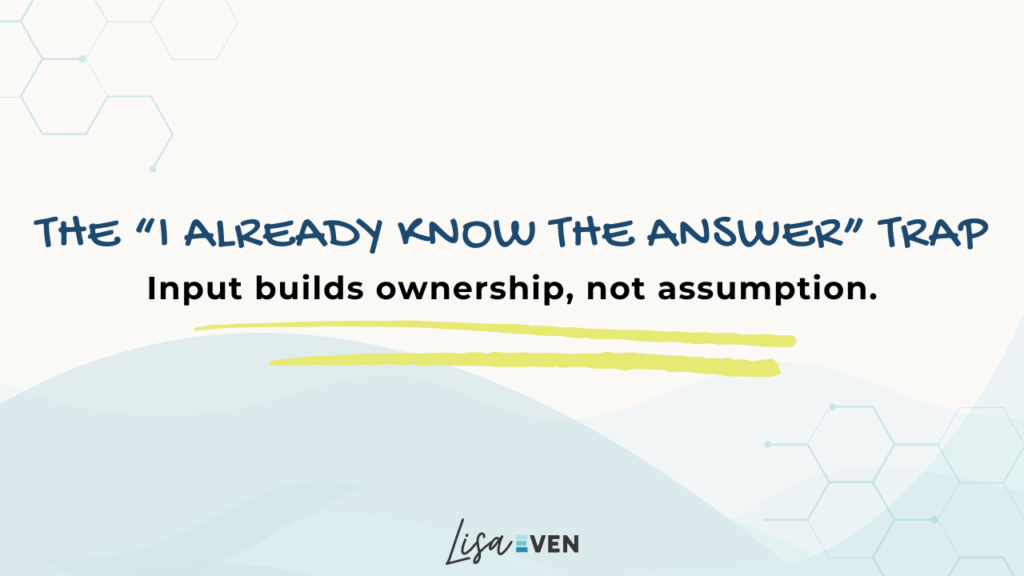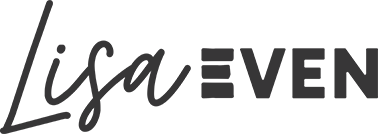
Leadership and life are oddly similar.
In both, we bump into moments where our thinking limits us, whether it’s assuming we already know the answer or believing something has to be harder than it really is. The trap is the same: we cut ourselves or others out of the process, and in doing so, we miss out on connection, growth, and possibility.
LEADERSHIP: The “I Already Know the Answer” Trap
Sometimes, as leaders, we skip asking the question because we’re convinced we already know the answer.
We don’t ask for input because we assume we know what they’ll say.
We don’t check if they’ll like the idea because we’ve already decided they won’t.
We don’t loop them in because time is short and getting input feels like it will only slow things down.
On the surface, those choices may come from good intention such as efficiency, clarity, or even protection. But here’s the catch: they quietly erode connection, engagement, and results. Before long, the team starts to think, “They don’t really care what I think. They never ask for our opinion.”
Picture rolling out a new scheduling system. You know the old one was clunky, and you’re confident the team will welcome the upgrade. So you get to work, skip asking for feedback, hit “go,” and move forward. But when people start using it, frustrations bubble up, not because the system is bad, but because no one asked them what mattered most. Suddenly it’s not just about the tool, though the functionality isn’t perfect. It’s about feeling unseen and left out.
Because even if people agree with the direction, they still want to feel like they were part of it. They want to understand the “why.” They want to leave a fingerprint somewhere on the process, even if it’s small.
So the next time you catch yourself thinking, “I don’t need to ask, I already know the answer,” pause. You may know the answer. But if they weren’t part of the question, they’re less likely to care about the outcome.
Tip: Focus on targeted input. Ask for feedback on specific elements or options so you don’t open a can of worms but still create ownership and buy-in. Even something as simple as asking preference on option one or option two can make a big difference.
LIFE: Me-oh-my Limiting Beliefs
Have you ever wondered what quiet beliefs might be steering your choices without you even noticing?
Here are a few of mine:
- “Everything has to be hard, because hard work is the only way to get what we want.”
- “Who am I to be doing, saying, or trying ___?”
- “Ambition and success can come across as boastful.” (Classic Midwesterner in me.)
These are limiting beliefs, thoughts that shrink possibility.
For me, the sneakiest one is the “hard equals worthy” myth. I used to believe if something wasn’t grueling, it wasn’t real. When things came easily, I’d brace for disaster: That was a fluke. Something bad must be next.
A few months ago, I had a speaking opportunity come together with almost no friction. The timing worked, the client was enthusiastic, and the contract was signed in days. Instead of celebrating, my brain instantly went to: Wait…that was too easy. Something must be wrong. It took real effort to remind myself that ease isn’t a red flag. Sometimes things line up because you’ve been preparing for them all along. It’s the quiet work that no one sees.
But here’s what I’m practicing instead: things can be both hard and easy. Some tasks require grit, some flow effortlessly. And just because something feels easy doesn’t mean it’s less valuable or less deserved.
The shift is noticing the belief, naming it, and challenging it with a new thought. That’s where change begins.
What limiting belief have you been untangling lately? Hit reply, I’d love to hear.
P.S. Sometimes the smallest mindset shift creates the biggest ripple effect.
Want Lisa’s weekly blogs delivered to you via email? Sign up here!
